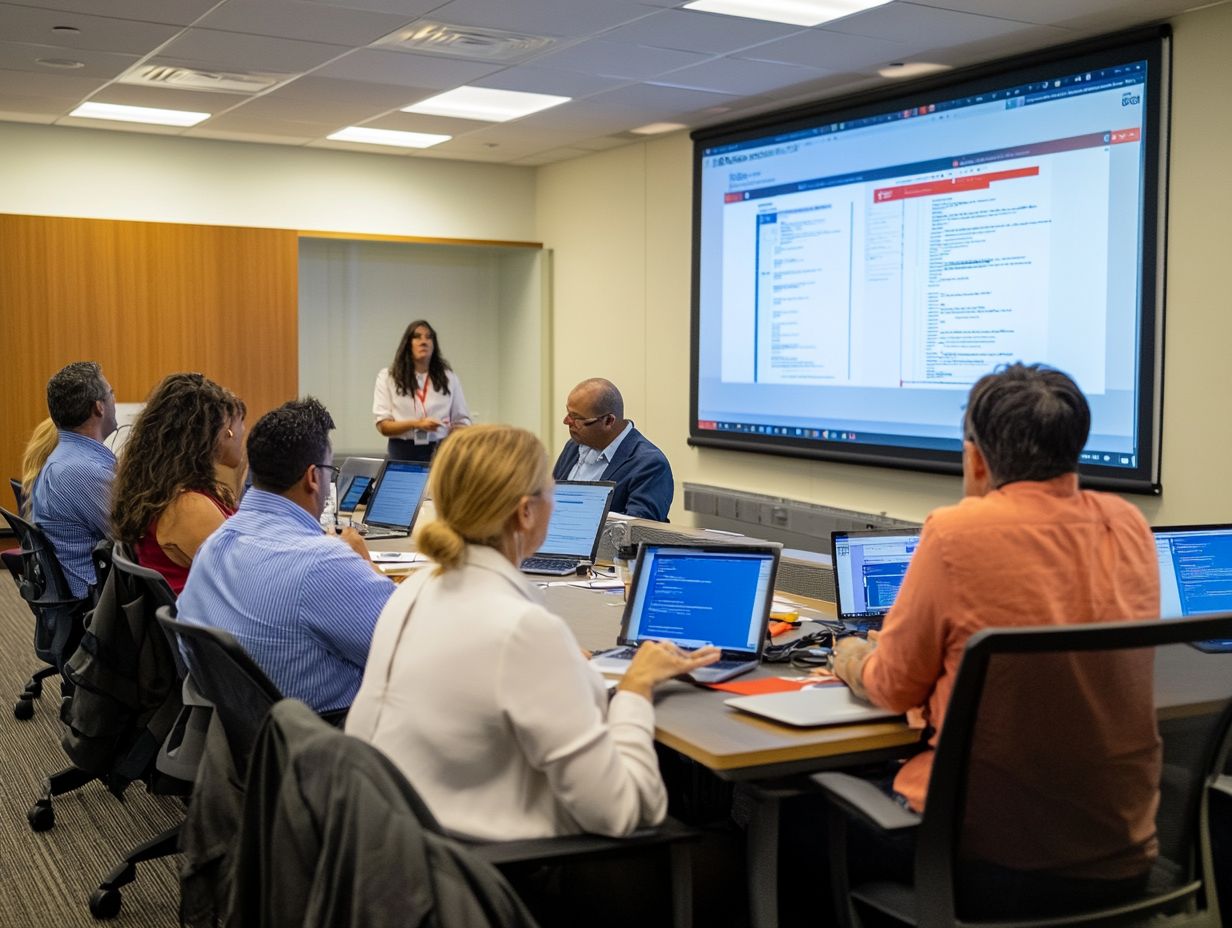5 Essential Tips for Learning Cybersecurity
In today s digital landscape, cybersecurity has become more essential than ever, with threats continuously evolving and impacting both individuals and organizations.
Whether you re just starting out or aiming to refine your skills, grasping the fundamentals is your crucial first step.
This article presents five essential tips to launch your journey into cybersecurity, guiding you from understanding the basics to networking with industry professionals.
You ll uncover common misconceptions, identify key skills you ll need, explore various career paths, and recognize the promising job opportunities that await in this dynamic field.
Dive in and empower yourself with knowledge; it s time to set the stage for a successful career in cybersecurity!
Contents
- Key Takeaways:
- 1. Start with the Basics
- 2. Understand the Different Types of Cybersecurity
- 3. Stay Up-to-Date with the Latest Threats and Trends
- 4. Practice Hands-On Learning
- 5. Network and Connect with Professionals in the Field
- Why Is Cybersecurity Important in Today’s Digital World?
- Frequently Asked Questions
- What are the 5 essential tips for learning cybersecurity?
- Why is it important to understand the basics of cybersecurity?
- How can I stay updated with the constantly evolving field of cybersecurity?
- Why is hands-on practice important for learning cybersecurity?
- How can networking with professionals benefit my cybersecurity learning journey?
- What is a security mindset and why is it important for learning cybersecurity?
Key Takeaways:

- Start with the basics to build a strong foundation in cybersecurity.
- Understand the different types of cybersecurity to identify potential threats and appropriate defense strategies.
- Stay updated on the latest threats and trends to stay ahead of cyber attacks.
1. Start with the Basics
Understanding the fundamentals of cybersecurity is crucial for protecting your personal information in today s digital landscape, where threats like malicious software and data breaches are rampant. Embracing effective IT security practices such as creating strong passwords, using two-step verification, and securing your networks is essential for safeguarding sensitive information and ensuring your online safety.
Grasping these basic concepts helps you navigate the digital world confidently and avoid common pitfalls that expose you to cyber threats. In an age where cyber attacks are becoming increasingly sophisticated, the importance of strong passwords cannot be overstated; they serve as your first line of defense against unauthorized access.
Encryption acts as a protective shield for your data, rendering it intelligible only to those who hold the decryption key.
Using two-step verification significantly enhances your security by requiring additional verification beyond just a password. This layered approach makes it much more challenging for potential intruders to gain access.
To further fortify your protection, utilizing tools like password managers helps you generate and store complex passwords, while Virtual Private Networks (VPNs) provide secure connections especially important when accessing networks in public spaces.
Collectively, these strategies form a robust framework for safeguarding your digital assets.
2. Understand the Different Types of Cybersecurity
The realm of cybersecurity offers a variety of specialized fields, each crafted to tackle unique challenges and vulnerabilities in IT security, compliance, and data protection. It’s crucial for you to grasp the different types of cybersecurity such as application security, network security, and information security if you aim to develop a robust cybersecurity strategy that effectively safeguards sensitive data and mitigates potential threats.
Each facet has its own distinct role. For instance, network security is all about protecting the integrity and usability of networks, while application security focuses on defending software applications from external attacks. Endpoint security is paramount for securing devices like laptops and smartphones, which are often prime targets for cybercriminals. Staying compliant with industry standards is equally vital, as it helps you meet regulatory requirements.
Meanwhile, antivirus software serves as your first line of defense against malware and other malicious software. By utilizing effective data backup methods like cloud backup services and external hard drives you ensure that vital information can be restored in the event of a data loss incident, thereby reinforcing your organization s overall security posture.
Now that you are equipped with these essential tips, take action and start your cybersecurity journey today!
3. Stay Up-to-Date with the Latest Threats and Trends
In today s ever-evolving digital landscape, staying informed about the latest cyber threats and trends is crucial. Understanding attacks, such as interception of communication between two parties and SIM swaps, is vital for implementing strong IT security measures that protect your assets.
Updating your software is essential don’t wait until it’s too late! These patches frequently address vulnerabilities that cybercriminals might exploit. Modern browsers have advanced security features to detect and mitigate threats, ensuring a safer online experience.
If you’re eager to deepen your understanding of these critical topics, resources like Herzing University offer valuable insights. National Cybersecurity Awareness Month is also an excellent reminder to prioritize your ongoing education in cybersecurity practices.
Add these strategies to your daily routine, and you can significantly enhance the protection of your personal information and digital assets against evolving cybersecurity threats.
4. Practice Hands-On Learning

Hands-on learning is invaluable for mastering cybersecurity. It equips you with the essential skills to develop effective strategies and protect clients from ever-evolving threats.
Engaging in real-world simulations, labs, and projects as part of your cybersecurity degree program like those offered by Herzing University deepens your understanding of critical concepts, such as identity verification and threat mitigation.
These experiential opportunities allow you to apply theoretical knowledge to practical scenarios, tackling genuine challenges in a controlled environment. For instance, virtual labs immerse you in realistic situations where you can practice responding to cyber incidents in real time.
This active participation sharpens your technical skills and cultivates critical thinking and problem-solving abilities. Both are vital for a successful career in this dynamic field.
By integrating various hands-on learning methods, educational institutions ensure you are well-prepared to navigate the complexities and demands of modern cybersecurity threats. Don’t miss out on these valuable insights!
5. Network and Connect with Professionals in the Field
Networking within the cybersecurity community is essential for your career growth and for exchanging knowledge with fellow professionals. By engaging with peers and experts at conferences, online forums, and events during National Cybersecurity Awareness Month, you ll gain valuable insights into current practices, emerging threats, and potential job opportunities.
Participating in these gatherings opens the door to a wealth of information that can enhance your skill set and broaden your perspective. Building connections with seasoned professionals can lead to invaluable mentorship opportunities, where they share their journeys, challenges, and best practices.
Collaboration is another key advantage; through shared projects and initiatives, you and your cybersecurity colleagues can leverage diverse skill sets to tackle complex security issues more effectively.
Ultimately, fostering these relationships deepens your understanding of the ever-evolving cybersecurity landscape and strategically positions you for future advancements in your career. Join a cybersecurity community today!
Why Is Cybersecurity Important in Today’s Digital World?
Cybersecurity is vital for protecting your personal information. In a digital world filled with threats, online safety is more important than ever.
As we rely on technology for communication, banking, and shopping, having strong security measures is crucial. Solutions like strong passwords, two-factor authentication, and regular data backups are essential.
Individuals and organizations face increasingly sophisticated attacks. Therefore, a solid plan for online safety is necessary to maintain trust and protect sensitive data.
Effective cybersecurity shapes business operations and customer engagement. When consumers feel their information is secure, they are more likely to shop online, boosting the economy.
For businesses, following compliance standards and implementing strict security protocols protects sensitive data and enhances reputation.
On a larger scale, national security is at risk. Cyber threats can endanger critical infrastructure and government operations.
What Are the Common Misconceptions About Cybersecurity?
Cybersecurity is often clouded by misconceptions that can undermine your online safety. You might think that just having antivirus software is enough, but overlooking other essential practices can leave you vulnerable.
This limited view can let threats sneak through, as cybercriminals constantly adapt their tactics. Even the most vigilant users can fall victim to phishing attacks, highlighting the importance of training to recognize suspicious emails and interactions.
Many people underestimate the power of strong, unique passwords and two-factor authentication. Relying solely on one aspect of cybersecurity creates a false sense of security.
It s crucial to adopt a mix of different approaches that combine technological solutions with proactive user education to truly fortify your defenses.
What Are the Key Skills Needed for a Career in Cybersecurity?

A successful career in cybersecurity demands a diverse skill set that includes technical knowledge, analytical thinking, and problem-solving abilities.
As a prospective cybersecurity professional, pursuing a degree in this field will help you gain a comprehensive understanding of compliance standards, risk management, and the practical application of security measures.
Beyond these foundational elements, developing strong communication skills is essential. This enables you to convey complex information effectively to both technical and non-technical stakeholders.
Programs like those at Herzing University are tailored to equip you with a well-rounded education, seamlessly blending theoretical insights with hands-on experience.
This approach ensures that you grasp the intricacies of security technologies while cultivating the critical soft skills necessary to thrive in today s workplace, enabling you to tackle real-world cybersecurity challenges with confidence.
What Are the Different Career Paths in Cybersecurity?
The field of cybersecurity offers a wide array of career paths tailored to various interests and skill sets. You can find roles ranging from IT security analysts to compliance professionals who ensure companies follow laws and regulations.
By pursuing a cybersecurity degree, you equip yourself with the foundational knowledge and qualifications necessary to explore these diverse roles within the industry.
Key areas include:
- Learn ethical hacking by actively seeking out vulnerabilities in systems to bolster defenses.
- Focus on risk assessment to identify and mitigate potential threats and uphold robust security protocols.
- Engage in security policy development to establish guidelines that govern organizational practices, ensuring compliance while effectively safeguarding sensitive information.
Each of these positions contributes to enhancing the overall security landscape and demands specific qualifications. For instance, certifications like CEH for ethical hackers or a comprehensive understanding of regulations for compliance professionals are essential.
As the importance of cybersecurity continues to rise, professionals in these roles are crucial for protecting digital infrastructures.
How Can One Gain Experience in Cybersecurity?
Gaining practical experience in cybersecurity is essential for crafting a successful career. You have many avenues to explore.
Engaging in internships, collaborating on projects, and participating in hands-on learning opportunities during your cybersecurity degree can dramatically enhance your skill set and marketability in the field.
Consider volunteering with local organizations or nonprofits. These experiences can provide invaluable exposure to real-world cybersecurity challenges while helping you build a professional network.
Industry competitions like Capture the Flag events provide a great way to test your skills against peers, fostering teamwork and honing problem-solving abilities.
By immersing yourself in these experiences, you’ll sharpen your technical expertise and gain insights into industry trends and best practices, which are crucial for staying competitive in this fast-evolving domain.
What Are the Job Opportunities and Salary Potential in Cybersecurity?
Cybersecurity jobs are booming! Now is the perfect time to dive into this dynamic field. The demand for cybersecurity professionals is skyrocketing, opening up a treasure trove of job opportunities and attractive salary potential across various sectors.
According to the Bureau of Labor Statistics and the Occupational Outlook Handbook, positions in cybersecurity are set to grow significantly, reflecting the urgent need for expertise in protecting digital environments.
Roles such as information security analysts, penetration testers, and security architects are not just in high demand; they also offer impressive salary prospects that often exceed six figures, depending on your experience and education.
Your earning potential depends on factors like your formal education level, relevant certifications, and proven expertise in the field.
While entry-level roles are available, those with advanced degrees and specialized certifications such as Certified Information Systems Security Professional (CISSP) or Certified Ethical Hacker (CEH) are likely to see a significant boost in their career trajectory.
As businesses continue to prioritize their online security, building a robust foundation in cybersecurity can be a highly lucrative career path for anyone ready to invest in their education and skills.
Frequently Asked Questions

What are the 5 essential tips for learning cybersecurity?
Here are five essential tips for mastering cybersecurity: understand the basics, stay updated, practice hands-on, network with professionals, and check out the top 10 resources for learning cybersecurity to enhance your knowledge.
Why is it important to understand the basics of cybersecurity?
Understanding the basics of cybersecurity is crucial because it provides a foundation for more advanced concepts. It helps in identifying potential vulnerabilities and understanding how to prevent cyber attacks.
How can I stay updated with the constantly evolving field of cybersecurity?
To stay updated with cybersecurity, follow industry experts and thought leaders on social media, attend conferences and workshops, and regularly read cybersecurity news and blogs.
Ready to start your cybersecurity journey? Explore educational programs and hands-on experiences today!
Why is hands-on practice important for learning cybersecurity?
Hands-on practice is the key to mastering cybersecurity! It allows you to apply your knowledge in real-world scenarios.
This practice also helps in identifying and solving problems that may occur during a cyberattack.
How can networking with professionals benefit my cybersecurity learning journey?
Networking with cybersecurity professionals offers valuable insights and advice. It can also lead to potential job opportunities.
You will learn from their experiences and gain a clearer understanding of the industry.
What is a security mindset and why is it important for learning cybersecurity?
A security mindset is a proactive and cautious approach to cybersecurity. It involves thinking about potential vulnerabilities and how to prevent them.
This mindset is essential for effectively learning and applying cybersecurity practices.






